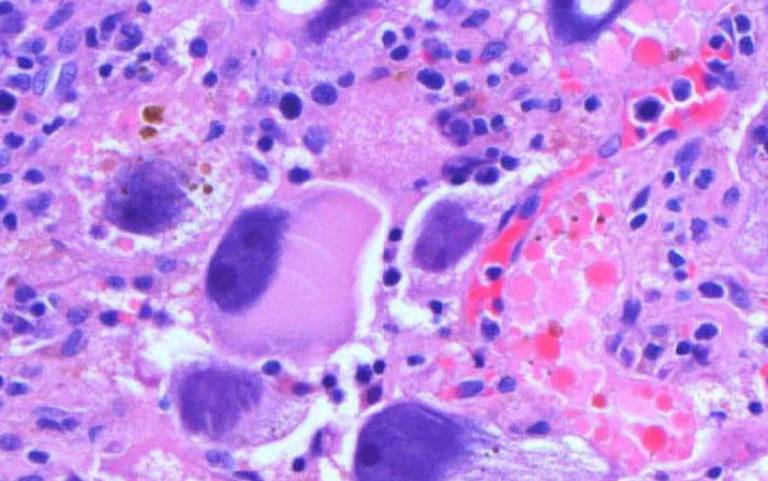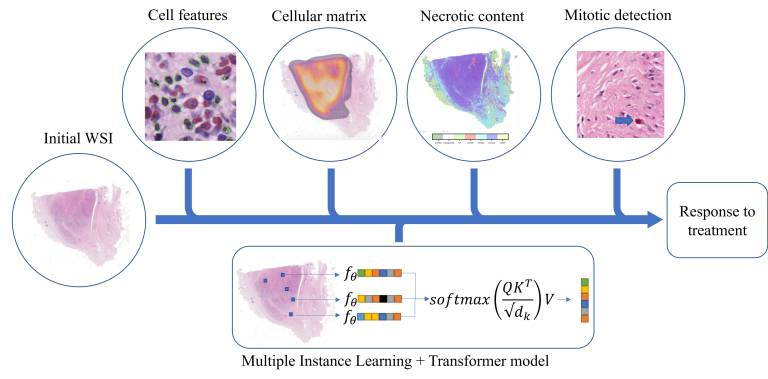Sarcoma research benefits as part of £13m fund for AI research in healthcare
14 August 2023

The UK Government has announced that £13 million will be invested to accelerate artificial intelligence innovation in healthcare.
In the funding allocation, UCL has been awarded more than £2.2m across four artificial Intelligence (AI)-driven research projects, one of which was a cross-faculty award to UCL Medical Physics and Biomedical Engineering researcher, Dr Charles-Antoine Collins-Fekete, and UCL Cancer Institute Professor Adrienne Flanagan for a project for improving the diagnosis of sarcoma (a rare cancer) in collaboration with UCL’s Department of Pathology at the Royal National Orthopaedic Hospital (RNOH) from where the clinical component is being led. The project also involves 23 other hospitals across the UK and Ireland and has received generous support from Sarcoma Charities; Chordoma UK, Sarcoma UK, the Bone Cancer Research Trust, Skeletal Cancer Trust and the Royal National Orthopaedic Hospital Charity.
Sarcomas are a group of rare cancers affecting the tissues that connect, support and surround other body structures and organs; for example, fat, muscle, bone and cartilage. The rarity of sarcoma, (2% of all cancers) and the large number of subtypes, makes it one of the most challenging diagnostic areas in pathology.
Classification of tumours into subtypes allows the selection of patients for specific treatments and reduces unnecessary exposure to toxic and expensive therapies. However, these diagnoses require specialist knowledge for each cancer type and whilst the need for diagnostic expertise is increasing, the number of pathologists available to provide diagnoses is set to decline up to 29% in the next five years.
The Co-Principal Investigators, Dr Charles-Antoine Collins Fekete, Professor Adrienne Flanagan, Professor Gary Royle and Dr Rohan Chakraborty commented "We are delighted to receive this UKRI award for the much-needed development of AI to support pathologists in classifying sarcoma, a large group of rare cancer types. This award demonstrates that the UKRI recognises the need for a multidisciplinary approach to research involving AI and health care. The research is being run across UCL faculties, by pathologists in UCL Cancer and computer scientists in Medical Physics. We are fortunate to be affiliated with the Royal National Orthopaedic Hospital where the pathologists are leaders in the field of sarcoma research. It is also a privilege to be engaged with so many sarcoma pathologists across the UK, without whose commitment, this project will not succeed. Through this initiative, we hope to improve the lives of patients."
Dr Lila Dinner, Deputy-Chief Executive and Chief Medical Officer at the Royal National Orthopaedic Hospital said “It's brilliant to see UKRI investment in vital AI development for sarcoma and we're proud to be a part of this pioneering research. Multidisciplinary approaches like this are essential to continually evolve our work in bone and soft tissue cancers and help us do more for patients. Together we will be improving the lives and outcomes of patients using targeted personalised treatments. We look forward to working with our UCL colleagues and others to accelerate the use of AI in healthcare.”
The use of AI in pathology is already yielding benefits, such as reducing errors and saving pathologists' time by identifying high-grade areas of prostate cancer. The team aims to utilise AI to ensure that the delivery of tissue diagnoses by pathologists is sustainable and supports the development of personalised treatments.
AI is a data-hungry process and building a computer vision model typically requires 100,000s of images. This project will involve developing a novel AI strategy which uses a small sample size of images (~1,000 images) and is adaptable to any cancer type.
The team will use existing deep-learning models to diagnose approximately 100 different subtypes of soft tissue and bone cancers in children and young adults. The model has been trained on 2,122 images and predicts the correct diagnosis in 87% of cases. The algorithm also prompts ancillary tests to streamline the diagnostic process.

Our new feature fusion model combines pathologist-known prognostics features alongside state-of-the-art vision AI with attention modules to classify and grade soft-tissue and bone tumours fusion between experts' domain knowledge and AI will significantly enhance the model's performance while yielding explainable outputs.
The development of AI for tissue diagnosis is timely as the UK is expected to fully adopt digital pathology, allowing digitised histological images to be examined on computer screens by both humans and AI by 2025. The infrastructure and study will leave a lasting legacy, acting as a framework for continued development that can be rapidly expanded with digital pathology. It can be further developed over time to adapt to new advances, transforming clinical services for patients and families.
The AI funding commitment was made as the UK continues its preparations to host the first international AI Safety Summit. UK Government announced that Matt Clifford, CEO of Entrepreneur First and Chair of the Advanced Research and Invention Agency, and Jonathan Black, Heywood Fellow at the Blavatnik School of Government at the University of Oxford, will lead the Summit preparations.
 Close
Close

